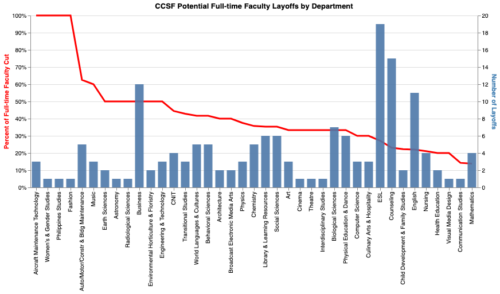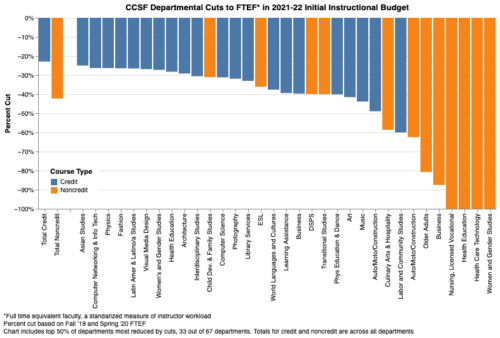Board Approves 160 Full-time Faculty Layoff Notices as Part of Sweeping Cuts
By Annette Mullaney
amullan4@mail.ccsf.edu
After hours of emotional public comment and, at times, testy debate among City College trustees and administrators that lasted until 2 a.m. the Board of Trustees voted 5-2 to approve sending notices of potential layoffs to 160 full-time faculty at their Feb. 25 meeting.
Over 300 people attended the meeting, where the board also voted unanimously to approve sending non-renewal of contract notices to 35 administrators at and below dean level.
The layoffs, if implemented, would represent a loss of nearly 30% of City College’s 541 full-time teaching staff and 74% of its administrators, part of the five-year budget plan passed by the board in November.

Actual layoffs will not be determined until May 15. “This is the worst case scenario,” said Deputy Chancellor Dianna Gonzales. Layoffs could be mitigated by negotiations for concessions from the faculty union AFT 2121, retirements, and additional funding, though Gonzales said that the latter wasn’t likely.
“We are absolutely committed to doing what is necessary to get creative and to lobby for additional funding but that bailout is not right around the corner,” Gonzales said, adding, “the biggest portion of it is going to be our interactions with AFT.”
The average department would lose a third of its full-time instructors. The English as a Second Language program (ESL), which has had its offerings slashed in recent years, would lose 19 instructors, the most of any department, amounting to 27% of its full-time faculty.
Philippines Studies, Fashion, and Women & Gender Studies would each lose their respective departments’ lone full-time instructor, and Aircraft Maintenance Technology would lose all three. These departments will still be offering courses next year, albeit fewer.

Some departments won’t lose any full time instructors, though this does not mean they are spared from cuts. According to AFT 2121 President Malaika Finkelstein in her report to the board, Disabled Students Program and Services (DSPS) “is facing a 40% cut … but the document [of layoffs] you’re looking at tonight doesn’t list DSPS at all, because our department is mostly part-timers.” She added, “this document is only one part of the devastating plan to shrink our college.”
Layoffs of part-time faculty do not need board approval. In fact, almost all part-timers in a department need to be laid off before full-timers, with exceptions for differing qualifications and scheduling.
The Initial Instructional Budget for Fall ‘21 and Spring ‘22 semesters, distributed in a Feb. 8 memo, reveals the larger cuts. Though further adjustments may be made, the budget represents a decrease of 27% in full-time equivalent faculty (FTEF), a standardized measure of teaching workload that corresponds to the amount of courses and other services offered, as compared with Fall ‘19 and Spring ‘20, the latest years for which data is publicly available.
Under this plan, the school’s noncredit division, almost a fifth of all FTEF in 2019-20, would be cut by 42%, and for-credit by 23%. Four programs, all noncredit, would be cut to zero FTEF, including Licensed Vocational Nursing and Health Education.
These reductions to zero appear to contradict the repeated promise by Chancellor Rajen Vurdien that no programs will be eliminated. Department Chair Council President Darlene Alioto was one of several instructors who pointed to programs they believed will be eliminated, saying that LGBT Studies will lose their associates and transfer degrees.
Gonzales said the administration will address the apparent disconnect at a special board meeting March 11 with a presentation about programmatic impact.
Part of the disconnect may stem from faculty and others’ professed lack of access to the data administrators say underlie these decisions, a contentious issue during the Feb. 25 board meeting. Academic Senate President Simon Hanson read a unanimous resolution from that body calling for the public release of financial and enrollment planning data used in deliberations. Several trustees asked to see more information providing context for the layoffs they were voting on. Student Trustee Vick Van Chung made a motion to table the vote until Vice Chancellor of Academic Affairs Tom Boegel brought data to indicate increased productivity after the cuts, which failed.
Asked about the requests for data, Gonzales said the board meeting “wasn’t the forum to really have that presented – that’s what the Thursday [March 11] meeting is about.”
Prior to the vote, administrators stressed the direness of the college’s financial situation. “Your option is either we begin to take steps to balance the budget or we put ourselves in a position for a state takeover,” said Vice Chancellor of Finances and Administration John al-Amin.
“The conversations that led to this resolution were incomplete and flawed,” said Chung. “If the administration worked on this since November, why are we only seeing it now? Why are we being cornered into a position where we have to make a decision tonight?”
The measure passed, with freshmen trustees Aliya Chisti and Alan Wong voting no, in addition to Chung’s advisory vote against. “We simply just don’t have the data,” Chung said.
In a March 3 press release, Vurdien said, “These are difficult times and we look forward to continue working collaboratively with all of our stakeholders to successfully implement the 5-year budget plan to insure the long-term financial sustainability of the college.”
Update: Since this article went to print, City College issued preliminary layoff notices to 163 faculty and 34 administrators, according to a March 9 press release.

As with the Peralta Colleges, where I have taught for twenty years, squeezing the number of classes available negatively impacts students by reducing options and access. Our community colleges are not ‘employment engines’ for faculty, but everyone needs to acknowledge that these colleges ARE employment engines for students and prospective students — and as we come out of the pandemic, every effort should be made to maintain access to education pathways including ample class offerings with slightly smaller student-to-teacher ratios for any classes taught partly or entirely online.
— Chris Weidenbach
English Dept. chair
Laney.College Oakland